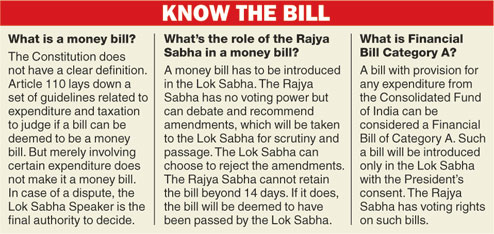
New Delhi, Dec. 1: Senior Congress leaders in the Rajya Sabha had a battle of words with the government and the Chair over alleged misuse of the money bill route to get bills passed in Parliament.
A brief discussion on a demand for a committee to examine the use of the money bill route led to the verbal duel between the treasury benches and deputy chairman P.J. Kurien on one side and Congress leaders P. Chidambaram and Jairam Ramesh on the other. Samajwadi Party leaders Naresh Agrawal and Ramgopal Yadav had called for the committee to be set up.
Opposition parties have in recent months frequently complained that the Narendra Modi regime has been taking the money bill route for ordinary bills to bypass the Rajya Sabha, where the government is in a minority. The Rajya Sabha does not have voting rights on money bills.
When the Aadhaar Bill was passed as a money bill in March this year, Ramesh had objected. Finance minister Arun Jaitley had then pointed to the Lok Sabha website and cited precedents during Congress rule. Jaitley cited the African Development Bank Bill (ADB), 1983, and the Juvenile Justice (JJ) Bill, 1986, to prove his point. But Ramesh had dug out Rajya Sabha records to argue that the two bills were not money bills. Parliament's records were more authentic than the website, he said.
The Aadhaar law aims at delivery of government benefits and services to people after verification of their Aadhaar number.
Ramesh today raised the Aadhaar bill to accuse the government of misusing the money bill provision, drawing a sharp reaction from the treasury benches. The Congress leader made certain references against Jaitley which were expunged by Kurien.
"The issue is not whether this is a money bill or that is not a money bill, but the issue is the use of the money bill route to deliberately bypass the Rajya Sabha," he said.
Ramesh then targeted the Chair citing a recent ruling on the Andhra Pradesh Reorganisation (Amendment) Bill, 2015, introduced in the upper House as a private member's bill by K.V.P. Ramachandra Rao. The bill seeks special status for Andhra.
Every member has the right to bring a bill on any matter as a private member's bill.
The government has been pleading that this bill was a money bill. The Rajya Sabha referred the bill to the Lok Sabha Speaker, who ruled that it was not a money bill. However, the Lok Sabha secretary-general had given the opinion that since the bill has a provision to establish a separate high court for Andhra, involving expenditure, hence it is a Financial Bill of Category 'A' that can be introduced in the Lok Sabha only.
The bill was sent to the ministry of law and justice, which said it was Financial Bill of Category 'A'. On November 18, the Chair gave the ruling that it was a Financial Bill of Category 'A' and terminated further discussion on it. Ramesh criticised the Chair for that ruling.
Led by urban development minister Venkaiah Naidu, the treasury benches criticised Ramesh for "casting aspersions" on the Chair. "This is something unheard of.... He cannot cast aspersions on the Chair," Naidu said.
Chidambaram supported Ramesh and said any constitutional authority can make mistakes and that the Opposition was urging the Chair to reconsider its ruling.
Kurien expunged all aspersions against the Chair. "All aspersions against the leader of the House and the Chair are expunged... nobody can question the ruling of the Chair. It is final," Kurien said.
Plea to President
Sixteen Opposition parties, including Trinamul and Left, today petitioned the President - as the custodian of the Constitution - to intervene and stop the stifling of the legislative process, alleging that their rights as Lok Sabha MPs were being trampled upon.
The immediate provocation was the manner in which the Taxation Laws (2nd Amendment) Bill was passed on Tuesday, without discussion and prior notice to the MPs.











